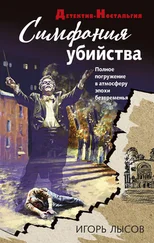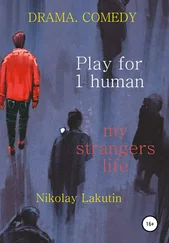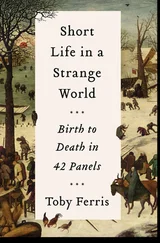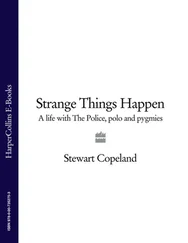Douglas Hofstadter - I Am a Strange Loop
Здесь есть возможность читать онлайн «Douglas Hofstadter - I Am a Strange Loop» весь текст электронной книги совершенно бесплатно (целиком полную версию без сокращений). В некоторых случаях можно слушать аудио, скачать через торрент в формате fb2 и присутствует краткое содержание. Жанр: Прочая документальная литература, на английском языке. Описание произведения, (предисловие) а так же отзывы посетителей доступны на портале библиотеки ЛибКат.
- Название:I Am a Strange Loop
- Автор:
- Жанр:
- Год:неизвестен
- ISBN:нет данных
- Рейтинг книги:4 / 5. Голосов: 1
-
Избранное:Добавить в избранное
- Отзывы:
-
Ваша оценка:
- 80
- 1
- 2
- 3
- 4
- 5
I Am a Strange Loop: краткое содержание, описание и аннотация
Предлагаем к чтению аннотацию, описание, краткое содержание или предисловие (зависит от того, что написал сам автор книги «I Am a Strange Loop»). Если вы не нашли необходимую информацию о книге — напишите в комментариях, мы постараемся отыскать её.
I Am a Strange Loop — читать онлайн бесплатно полную книгу (весь текст) целиком
Ниже представлен текст книги, разбитый по страницам. Система сохранения места последней прочитанной страницы, позволяет с удобством читать онлайн бесплатно книгу «I Am a Strange Loop», без необходимости каждый раз заново искать на чём Вы остановились. Поставьте закладку, и сможете в любой момент перейти на страницу, на которой закончили чтение.
Интервал:
Закладка:
I should, however, immediately point out that a phrase such as “this formula” is nowhere to be found inside Gödel’s cagey formula — no more than the phrase “this audience” is contained in Cagey’s line “Anyone who crosses the picket line to go into Alf and Bertie’s Posh Shop is scum.” The unanticipated meaning “People in this audience are scum” is, rather, the inevitable outcome of a blatantly obvious analogy (or mapping) between two entirely different picket lines (one outside the theater, one on stage), and thus, by extension, between the picket-crossing members of the audience and the picket-line crossers in the play they are watching.
The preconception that an obviously suspicion-arousing word such as “this” (or “I” or “here” or “now” — “indexicals”, as they are called by philosophers — words that refer explicitly to the speaker or to something closely connected with the speaker or the message itself) is an indispensable ingredient for self-reference to arise in a system is shown by Gödel’s discovery to be a naïve illusion; instead, the strange twisting-back is a simple, natural consequence of an unexpected isomorphism between two different situations (that which is being talked about, on the one hand, and that which is doing the talking, on the other). Bertrand Russell, having made sure that all indexical notions such as “this” were absolutely excluded from his formal system, believed his handiwork to be forever immunized against the scourge of wrapping-around — but Kurt Gödel, with his fateful isomorphism, showed that such a belief was an unjustified article of faith.
Numbers as a Representational Medium
Why did this kind of isomorphism first crop up when somebody was carefully scrutinizing Principia Mathematica ? Why hadn’t anybody thought of such a thing before Gödel came along? It cropped up because Principia Mathematica is in essence about the natural numbers, and what Gödel saw was that the world of natural numbers is so rich that, given any pattern involving objects of any type, a set of numbers can be found that will be isomorphic to it — in other words, there are numbers that will perfectly mirror the objects and their pattern, numbers that will dance in just the way the objects in the pattern dance. Dancing the same dance is the key.
Kurt Gödel was the first person to realize and exploit the fact that the positive integers, though they might superficially seem to be very austere and isolated, in fact constitute a profoundly rich representational medium. They can mimic or mirror any kind of pattern. Like any human language, where nouns and verbs (etc.) can engage in unlimitedly complex dancing, the natural numbers too, can engage in unlimitedly complex additive and multiplicative (etc.) dancing, and can thereby “talk”, via code or analogy, about events of any sort, numerical or non-numerical. This is what I meant when I wrote, in Chapter 9, that the seeds of PM ’s destruction were already hinted at by the seemingly innocent fact that PM had enough power to talk about arbitrarily subtle properties of whole numbers.
People of earlier eras had intuited much of this richness when they had tried to embed the nature of many diverse aspects of the world around us — stars, planets, atoms, molecules, colors, curves, notes, harmonies, melodies, and so forth — in numerical equations or other types of numerical patterns. Four centuries ago, launching this whole tendency, Galileo Galilei had famously declared, “The book of Nature is written in the language of mathematics” (a thought that must seem shocking to people who love nature but hate mathematics). And yet, despite all these centuries of highly successful mathematizations of various aspects of the world, no one before Gödel had realized that one of the domains that mathematics can model is the doing of mathematics itself.
The bottom line, then, is that the unanticipated self-referential twist that Gödel found lurking inside Principia Mathematica was a natural and inevitable outcome of the deep representational power of whole numbers. Just as it is no miracle that a video system can create a self-referential loop, but rather a kind of obvious triviality due to the power of TV cameras (or, to put it more precisely, the immensely rich representational power of very large arrays of pixels), so too it is no miracle that Principia Mathematica (or any other comparable system) contains self-focused sentences like Gödel’s formula, for the system of integers, exactly like a TV camera (only more so!), can “point” at any system whatsoever and can reproduce that system’s patterns perfectly on the metaphorical “screen” constituted by its set of theorems. And just as in video feedback, the swirls that result from PM pointing at itself have all sorts of unexpected, emergent properties that require a brand-new vocabulary to describe them.

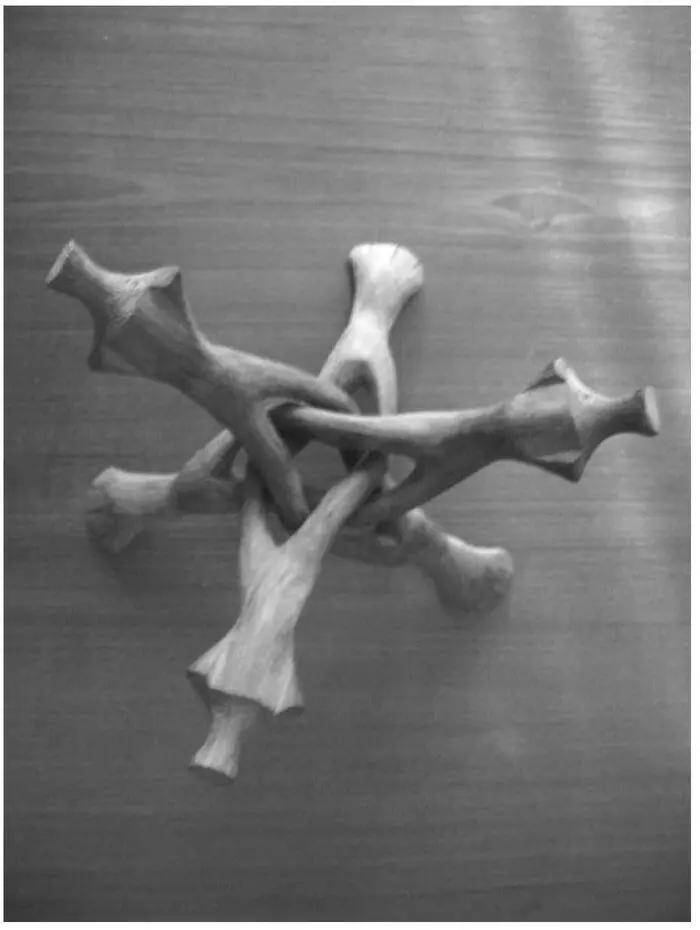
CHAPTER 12
On Downward Causality

Bertrand Russell’s Worst Nightmare
TO MY mind, the most unexpected emergent phenomenon to come out of Kurt Gödel’s 1931 work is a bizarre new type of mathematical causality (if I can use that unusual term). I have never seen his discovery cast in this light by other commentators, so what follows is a personal interpretation. To explain my viewpoint, I have to go back to Gödel’s celebrated formula — let’s call it “KG” in his honor — and analyze what its existence implies for PM.
As we saw at the end of Chapter 10, KG’s meaning (or more precisely, its secondary meaning — its higher-level, non-numerical, non-Russellian meaning, as revealed by Gödel’s ingenious mapping), when boiled down to its essence, is the whiplash-like statement “KG is unprovable inside PM. ” And so a natural question — the natural question — is, “Well then, is KG indeed unprovable inside PM ?”
To answer this question, we have to rely on one article of faith, which is that anything provable inside PM is a true statement (or, turning this around, that nothing false is provable in PM ). This happy state of affairs is what we called, in Chapter 10, “consistency”. Were PM not consistent, then it would prove falsities galore about whole numbers, because the instant that you’ve proven any particular falsity (such as “0=1”), then an infinite number of others (“1=2”, “0=2”, “1+1=1”, “1+1=3”, “2+2=5”, and so forth) follow from it by the rules of PM. Actually, it’s worse than that: if any false statement, no matter how obscure or recondite it was, were provable in PM, then every conceivable arithmetical statement, whether true or false, would become provable, and the whole grand edifice would come tumbling down in a pitiful shambles. In short, the provability of even one falsity would mean that PM had nothing to do with arithmetical truth at all.
What, then, would Bertrand Russell’s worst nightmare be? It would be that someday, someone would come up with a PM proof of a formula expressing an untrue arithmetical statement (“0 = s0” is a good example), because the moment that that happened, PM would be fit for the dumpster. Luckily for Russell, however, every logician on earth would give you better odds for a snowball’s surviving a century in hell. In other words, Bertrand Russell’s worst nightmare is truly just a nightmare, and it will never take place outside of dreamland.
Читать дальшеИнтервал:
Закладка:
Похожие книги на «I Am a Strange Loop»
Представляем Вашему вниманию похожие книги на «I Am a Strange Loop» списком для выбора. Мы отобрали схожую по названию и смыслу литературу в надежде предоставить читателям больше вариантов отыскать новые, интересные, ещё непрочитанные произведения.
Обсуждение, отзывы о книге «I Am a Strange Loop» и просто собственные мнения читателей. Оставьте ваши комментарии, напишите, что Вы думаете о произведении, его смысле или главных героях. Укажите что конкретно понравилось, а что нет, и почему Вы так считаете.





